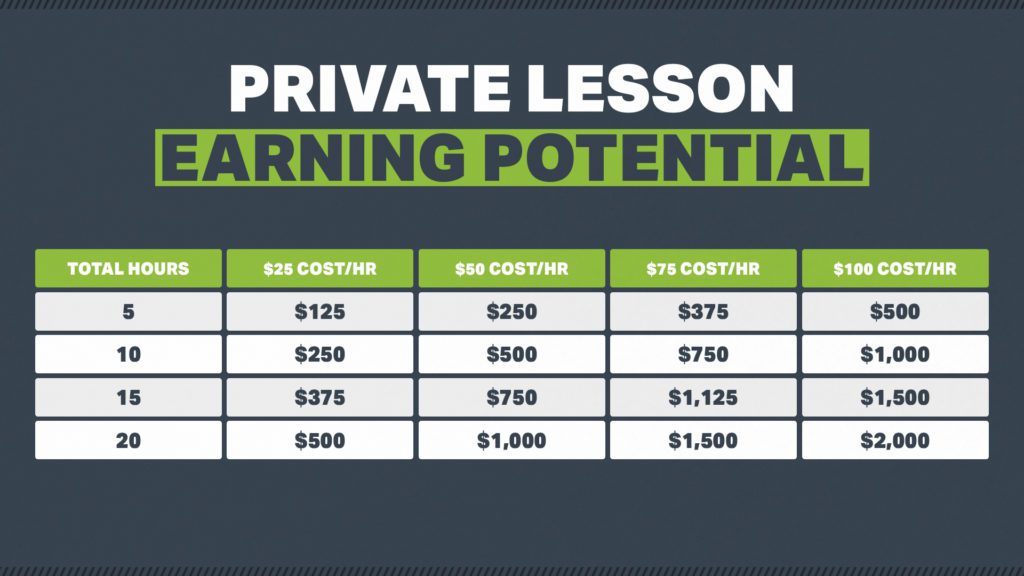Similar to sports camps, private lessons are a great way for athletes to connect with and coach the next generation of athletes in their community while earning compensation from their skills. Private lessons provide big opportunities for athletes in skill-based and individual sports, including those participating in non-revenue sports such as diving, golf, gymnastics, tennis, and more.
Private Lessons can range anywhere from $25 to over $100 an hour depending on the sport, demand, and ultimately, how an athlete determines their personal value. An athlete can spend anywhere from 1-2 hours to 20+ hours a week coaching private lessons. Depending on the cost and hours put into coaching private lessons, an athlete could bring in anywhere from $125 to $2,000+ per week.
Multiply that by 8 weeks, it’s realistic that athletes could earn anywhere from $1,000 to $16,000 over a summer or offseason break.

Set Schedule and Rate
The most important step to get started with private lessons is to maintain consistent times and a consistent rate. By having consistent time slots, athletes can maximize revenue by having multiple recurring lessons rather than sporadic one-offs. Having time that fits into the athlete’s schedule also allows for them to manage their time and allow for other commitments throughout the day. By setting a consistent rate, you’ll have consistency and confidence in charging that rate for any client.
Acquire Location and Equipment
Another precursor is securing a location to host lessons. Check to see if you need to reserve a location like a park tennis court, or pay a fee at a club for court, field, or ice time. If there is a venue fee, be sure to take this into consideration in the rate you change. The same goes for any equipment that would need to be rented or provided.
Marketing and Communication
Let your network know that you are teaching private lessons. By tapping into your personal social media channels, sharing the message with community groups, and asking previous clubs and teams you’ve played for to pass along information to current participants. Continue communication with clients and let them know if there is a change in time or date of a lesson due to weather or something else. By setting clear communication with your client, chances are they’ll be clear at communicating with you too.
Be sure to post about your lessons on social media, and encourage clients to share their experience on their personal channels, too.
Disclosure
At the conclusion of each session, be sure to disclose all payment activities pursuant to your institution or governing body to remain compliant and eligible in your sport.
Personal Experience
We sat down with WTA player and former UMass Tennis player, Brittany Collens to discuss the benefits of private lessons and how she realized their value after graduation.
Currently, student-athletes can find a summer job that has nothing to do with their sport or major, but are unable to teach the sport they love and actively train for. Not every student-athlete is on a full scholarship, so being able to maximize time-off would provide economic security for student-athletes to focus on their sport during the season.
Collens quickly realized the economic potential of teaching private lessons post-graduation. Also valuable are the people she has met through lessons, opening the door to many more opportunities. Collens also noted that private lessons could also make an impact in recruiting while shedding a positive light on college sports. If a student-athlete is hosting private lessons, the student receiving lessons will likely enjoy a positive experience and become a fan of that program for life.




